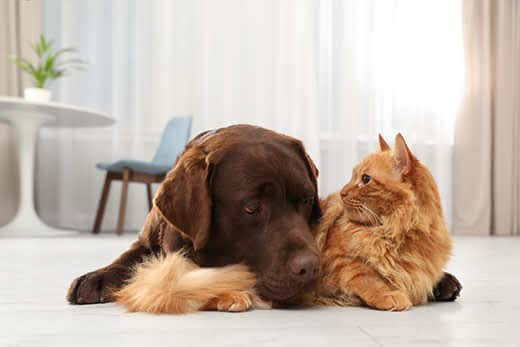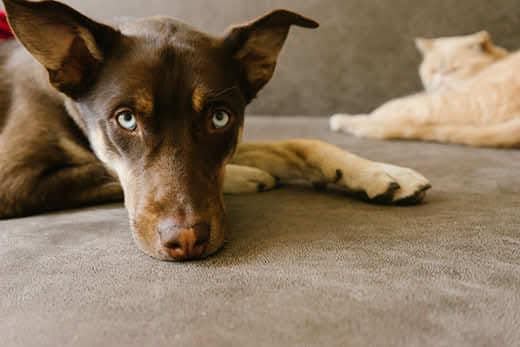
-
Find the right food for your pet
Take this quiz to see which food may be the best for your furry friend.
Find the right food for your pet
Take this quiz to see which food may be the best for your furry friend.
Featured products
 Small & Mini Savory Stew with Chicken & Vegetables Dog Food
Small & Mini Savory Stew with Chicken & Vegetables Dog FoodA delicious complement to the nutrition of Science Diet Small & Mini 7+ dog food
Shop Now Adult 7+ Perfect Digestion Chicken, Whole Oats & Brown Rice Recipe Dog Food
Adult 7+ Perfect Digestion Chicken, Whole Oats & Brown Rice Recipe Dog FoodScience Diet's breakthrough nutrition supports ultimate digestive well-being & healthy microbiome for dogs age 7+
Shop Now Adult Healthy Cuisine Roasted Chicken, Carrots & Spinach Stew Dog Food
Adult Healthy Cuisine Roasted Chicken, Carrots & Spinach Stew Dog FoodDelicious roasted chicken paired with tender vegetables in a succulent stew
Shop NowFeatured products
 Adult Savory Entrée Can Variety Pack Cat Food
Adult Savory Entrée Can Variety Pack Cat FoodPrecisely balanced nutrition with the delicious taste of savory minced chicken to help fuel the energy needs of cats during the prime of their life
Shop Now Adult 7+ Tender Tuna Dinner Cat Food
Adult 7+ Tender Tuna Dinner Cat FoodWith delicious chunks in a decadent gravy
Shop Now Adult 7+ Senior Vitality Chicken & Vegetable Stew Cat Food
Adult 7+ Senior Vitality Chicken & Vegetable Stew Cat FoodImproves Everyday Ability to Get Up & Go
Shop Now -
Dog
- Dog Tips & Articles
-
Health Category
- Weight
- Food & Environmental Sensitivities
- Urinary
- Digestive
- Joint
- Kidney
-
Life Stage
- Puppy Nutrition
- Adult Nutrition
- Senior Nutrition
Cat
- Cat Tips & Articles
-
Health Category
- Weight
- Skin & Food Sensitivities
- Urinary
- Digestive
- Kidney
-
Life Stage
- Kitten Nutrition
- Adult Nutrition
Featured articles
 Does My Pet Hate Me?
Does My Pet Hate Me?Learn tips for bonding with your pet if you've ever thought, 'My dog doesn't like me, or 'Why do I have a standoffish cat?'
Read More Why Are Dogs and Cats So Cute?
Why Are Dogs and Cats So Cute?If waggy puppy dog tails and furry kitten yawns make you swoon, you're not alone. Why are cats so cute? And, dogs too! Let's find out!
Read More Do Dogs and Cats have Belly Buttons?
Do Dogs and Cats have Belly Buttons?Learn whether cats & dogs have belly buttons like humans, what the function is, and if there are any health concerns associated with it.
Read More -


In the battle between cats and dogs, dogs are usually depicted as the instigators. But sometimes, it's the cat who has it in for the family dog. Though it's certainly possible, and actually quite common, for cats and dogs to get along and even form friendships, some cats just want nothing to do with dogs. They may even turn hostile toward the friendliest and gentlest of pups, leaving you to wondering what to do.
This can be especially true of a shelter cat introduced into your home. Although shelter personnel should be able to tell you whether a cat gets along with dogs, sometimes cats are on their best behavior at the shelter and only show their true temperaments after they've spent some time in a home. It's also impossible to determine an adult shelter cat's background, so there might be something in their past that triggers an intense dislike of dogs. But your home doesn't have to be a battleground for pets. With enough time and patience, you can teach your kitty to peacefully coexist with your pup.

Understanding Types Aggression in Cats
There are several reasons why your cat may be acting out. Understanding these underlying causes of a cat's aggressive behavior can help you identify triggers and put a stop to your pet's hostile antics, explains cat behavior expert, Pam Johnson-Bennett.
Fear Aggression
A fearful cat may react to your dog by trying to get away. If they feel trapped, they may try to make themself appear smaller by crouching, flattening their ears and wrapping their tail tightly around their body. If your pup doesn't take the hint to back off, your kitty will eventually lash out in what they perceive as self-defense.
Redirected Aggression
If your cat sees or hears something they want to attack but can't get to, such as another kitty outside the window, they may turn around and take out their pent-up aggression on the nearest target instead — in this case, your unwitting dog. Acts of redirected aggression can feel random because you aren't aware of what triggered them. It seems like your cat just decided to beat up on your poor pooch. But in reality, your dog is simply a convenient target — in the wrong place at the wrong time.
Territorial Aggression
A new cat joining your home may feel the need to quickly establish their territory and assert their dominance over the other household pets. In this case, any attacks they make on your dog are simply an attempt to establish boundaries and show your pup who's boss. If your dog is submissive and doesn't fight back, your kitty will only feel more encouraged to exhibit bullying behavior. The gentler a dog, the more likely they are to become a target for your cat's aggression.
Aggression Due to Overstimulation
If you've ever suffered the consequences of petting or playing with a cat beyond their tolerance threshold, you know how fast they can go from purring and playing to scratching and biting. Dogs may seal the same painful fate for themselves if they overstimulate a kitty.
Predatory Aggression
Stalking, pouncing, chasing and lying in wait for an ambush are all part of a cat's innate predatory instincts. Though birds, mice and other small animals are typically their targets, your kitty may take out their predatory behavior on other members of the family, including your dog, if actual prey is not available. If this is happening, it's a good indication that your cat isn't getting enough mental and physical stimulation and exercise; i.e., they're acting out because they're bored.

Unprovoked Aggression
Unprovoked aggression, attacking or lashing out without cause, is extremely rare for cats. Often, what appears to be unprovoked aggression is actually redirected aggression. However, there might be another cause for this behavior, such as your kitty experiencing pain or the effects of an underlying health condition. If your cat seems to be attacking your dog or another member of your household for no reason, consider taking them to the veterinarian to rule out any medical causes that might be in play.


Tasty Tips
Young pets may need several visits in their first year for vaccinations. Adult pets generally benefit from annual check-ups, while senior or special-needs pets might require more frequent visits.
My Cat Hates My Dog: What Should I Do?
To help your cat and dog get along or, at the very least, leave each other in peace, you'll want to follow these steps:
- Introduce a new cat very slowly. Keep the newcomer separated from established household pets by using crates, pet gates and closed doors. Allow your pets to sniff and get to know each other through the safety of barriers, closely supervising face-to-face interactions, until it's clear that they will either accept or ignore one another. Be patient. It might take weeks or even months to fully integrate a new cat into a household with other pets — especially if you're dealing with a fearful or aggressive kitty.
- Prioritize your cat's safety. If your kitty senses that they're safe, they might not feel the need to protect themself as aggressively, explains PetHelpful. You can help them feel more secure by providing an escape route, either to another room where your pup can't go or to a high perch where your dog can't reach. Give your kitty their own safe space where they can hide and calm down whenever they feel threatened or overstimulated.
- Monitor your kitty's stress. A new home is full of potential stressors for a cat. Since stressed kitties are more likely to be on edge and easily triggered, you'll want to do whatever you can to help them feel comfortable and calm. Beyond providing a safe space for your cat to hide and relax, respect their boundaries and consider investing in an over-the-counter pheromone spray or plug-in. These products are specially designed to keep cats calm. Additionally, you'll want to separate your cat's feeding area from your dog's. And because cat's don't always come right in and gobble up their food like a lot of dogs do, you'll want to make sure your dog doesn't have access to your cat's food bowl when they're not around.
- Give your cat a lot of playtime. Regular exercise and play help your cat exert any pent-up energy and aggression that might otherwise be taken out on your pup. If your cat is prone to lashing out when they're overstimulated, move your dog to another room until playtime is over. Then, ensure your cat gets enough time to cool down before they interact with your pup. Provide plenty of interactive toys for your cat to pounce on and attack to help satisfy their natural prey instincts.
- Break up fights safely. If your pets start feuding, don't insert yourself between them or start yelling, as it can only exacerbate the situation. Instead, try to safely interrupt the fight by making a loud, sudden noise to startle them and attract their attention. If that doesn't work, try throwing a blanket over the fighting pair or spraying them with water.
If, after trying these steps, you find that your cat is still attacking your pup without any provocation or identifiable cause, consider speaking with an animal behaviorist or your vet. They can help you get to the bottom of why your kitty just won't leave your pup alone. In most cases, however, establishing peace and harmony in your home comes down to patience and ensuring that your pets get the attention and care they need.


Jean Marie Bauhaus is a pet parent, pet blogger, and novelist from Tulsa, Oklahoma, where she usually writes under the supervision of a lapful of fur babies.
Related products

Improves Everyday Ability to Get Up & Go

With delicious chunks in a decadent gravy

Precisely balanced nutrition with the delicious taste of savory minced chicken to help fuel the energy needs of cats during the prime of their life

Supports energy level and beautiful fur in mature cats
Related articles

Learn whether cats & dogs have belly buttons like humans, what the function is, and if there are any health concerns associated with it.

Learn tips for bonding with your pet if you've ever thought, 'My dog doesn't like me, or 'Why do I have a standoffish cat?'

If waggy puppy dog tails and furry kitten yawns make you swoon, you're not alone. Why are cats so cute? And, dogs too! Let's find out!

Discover how your pets might be impacted by the loss of another. Learn how to recognize their signs of grieving & how to help them cope with their loss.

Put your pet on a diet without them knowing
Our low calorie formula helps you control your pet's weight. It's packed with high-quality protein for building lean muscles, and made with purposeful ingredients for a flavorful, nutritious meal. Clinically proven antioxidants, Vitamin C+E, help promote a healthy immune system.
Put your pet on a diet without them knowing
Our low calorie formula helps you control your pet's weight. It's packed with high-quality protein for building lean muscles, and made with purposeful ingredients for a flavorful, nutritious meal. Clinically proven antioxidants, Vitamin C+E, help promote a healthy immune system.

